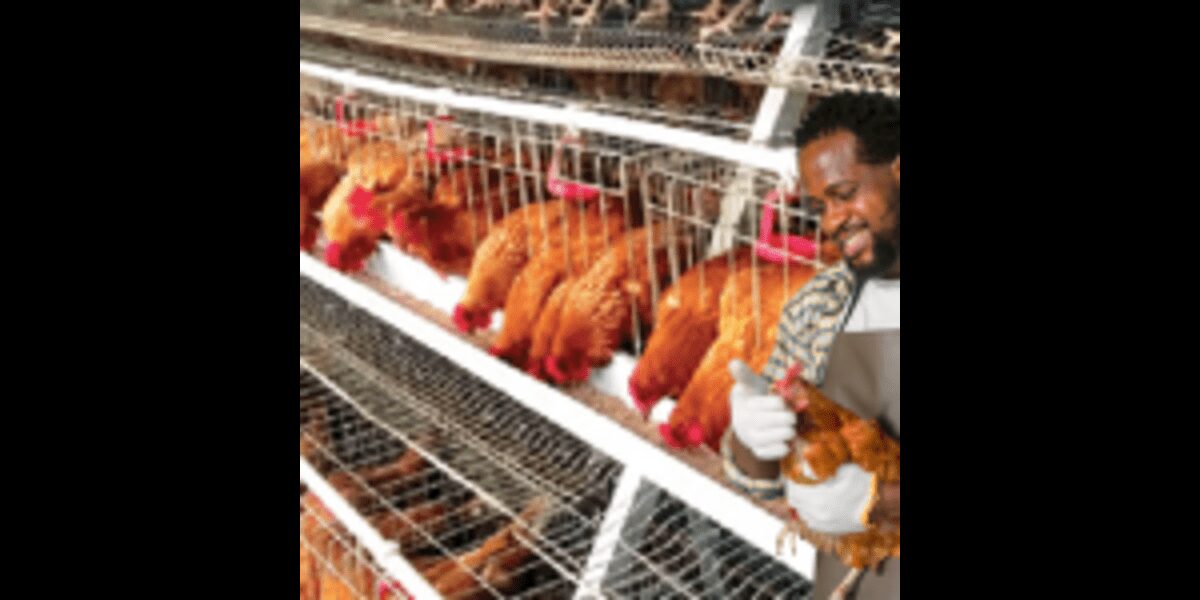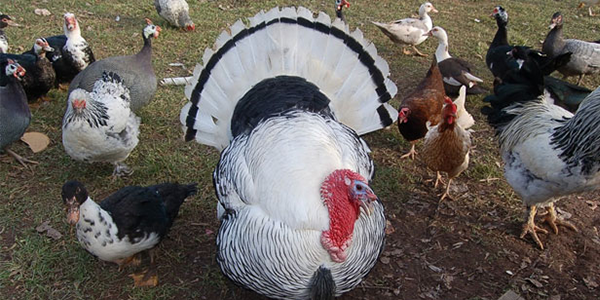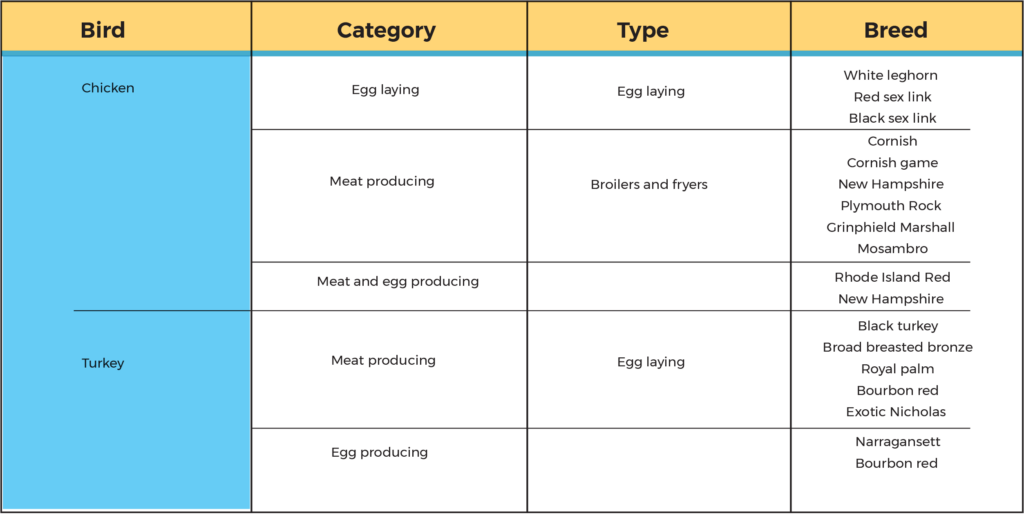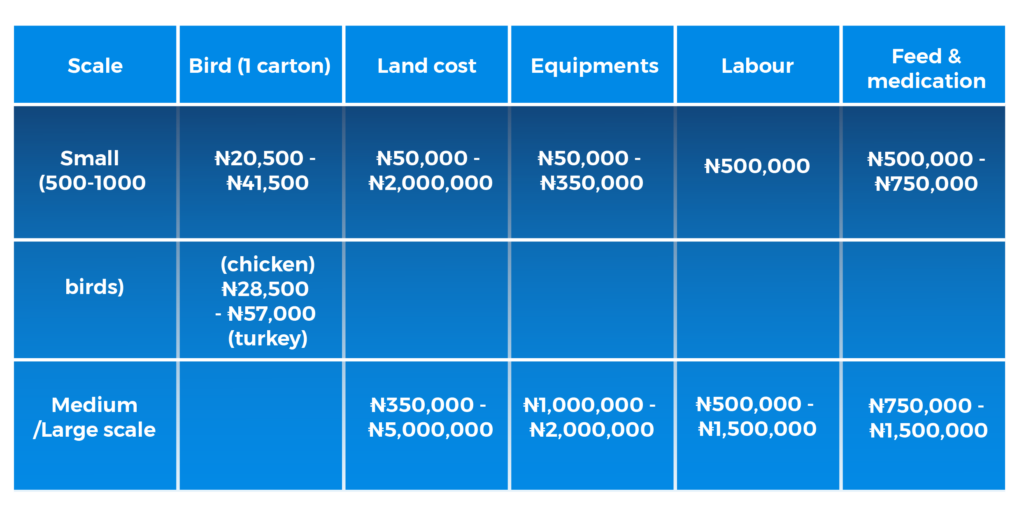How to Start a Poultry Farm in Nigeria

by Counseal Team
Updated July 26, 2024

According to researchers at CSIRO, production of poultry meats and eggs only meets 30% of the demand. Hence, it’s one of the most lucrative ventures in the country.
In this article, we guide you through how to set up your poultry farm, employ expert hands and market your produce.
Let’s dive into the 5 step guide to starting your own poultry business in Nigeria.
1. Conduct series of surveys

A survey or research will help you build a solid foundation for your poultry business. As profitable as poultry farming is, it is a delicate venture that you do not want to go into without knowing it well. So we have outlined below the items you need to conduct your survey on:
Research type of birds and supplier
We will focus on chicken and turkey in this guide as they have the highest demand in Nigeria. Below is a chart that helps you understand the types and breeds of chicken and turkey:

Table 1. Note: Cockerels are male chickens, so there are no Cockerels that are layers.
This table helps you to ask appropriate questions during your survey. You won’t look or sound ignorant and won’t get exploited.
Taking online poultry courses to understand birds will also be helpful. Some people even go as far as understudying an operating farm. You can try this too. The end goal is that you are grounded before you start your own poultry farm.
Carve a niche
It is important that you focus on a particular sector of poultry farming. You cannot be everywhere. You could choose between rearing chicken or turkey, or both. Whatever your choice is, you still need to choose either of the following:
- Meat production
- Egg production
- Egg and meat production
- Hatchery
- Feed production
Here, you will gain the benefits of knowing about birds. You’ll be able to decide if you want to focus on layers only, broilers only, or both. You might also not be interested in eggs or meat, so you could just focus on breeding the birds. As mentioned earlier, demand for poultry products in Nigeria is very high, hence any sector you choose is profitable.
Know your shelter options
One thing to also note during your survey is the type of housing you want to give your birds. Shelter in poultry is very important for productivity. There are 4 main shelter types for poultry farming: the free-range shelter, the semi-intensive shelter, the intensive shelter, and the folding unit shelter.
Of these 4 shelters, the intensive shelter system is the ideal for commercial farming. The following are the main types of intensive poultry shelter:
- Deep litter system
- Wired floor system
- Combination of wired floor and deep litter systems
- Aviaries
- Battery system
Consider your poultry feed
For every stage of growth, the feed for poultry birds differ, so your survey should include knowing about the different types of feed. Poultry feeds are classified as:
- Starter
- Grower
- Finisher (only for meat-producing birds)
- Layers ( only for egg-producing birds)
We have listed below some of the common chicken feed brands in Nigeria ( note that these chicken feeds are the same for turkeys):
- Top feeds
- Animal care feeds
- Hybrid feeds
- Chikun feeds
- Vital feeds
Each brand has its own ration or category of feeds for different birds and growth stages. So, be sure to understand which feed is for what stage when you choose a brand.
Do a market survey
This is the point in your survey where you have to think about your brand. Remember, we talked about competition earlier? Now you need to study them deeply. Look at who does what you want to do well and who doesn’t. What makes them better or worse and how you can leverage their strengths and weaknesses to become a better brand in the poultry industry.
You want your customers to know you are new but better than the existing businesses. So, you also need to study who your customers are. Know what they want, how they want it, what they see in other poultry farms that make them go there. You could conduct a survey for this.
Some of the things to consider in branding are pricing, promos, adverts (PR), business portfolio (logo, brand colour, brand font, slogan etc.). You should build a unique selling point. We will delve more into this later, but if you need help with building your brand, you can speak with one of our business experts.
2. Source Your Funding

We are excited for you if you already have some funds set apart for the poultry farm. However, if you don’t, this is not a reason for you to back down on your dreams. The Nigerian government has different programs in place to encourage farming in Nigeria. There are also non-governmental and international aids that could help.
Some ways you can fund your business are:
- Loans (short or long-term)
- Investments (seed or angel investments)
- Grants
It is worthy of note here that, for most grant applications, you will be required to have a registered business name at least.
For any of the funding categories, you will need a business plan that shows how much you need to start your business. Table 2 below shows how much you need to set up your business:

You should note that because of the inflation rate in Nigeria, currently the costs above are subject to changes depending on the economic shifts. Also, the land costs are subject to obtainable costs in different locations.
3. Manage the location of your poultry
The site of your poultry is very essential to the success of your business on more than 1 level. Apart from deciding on leasing or buying, there are factors to consider in picking a location:
- Distance to residential areas
- Wind direction
- Adequate source of water
- Topography
- Easy accessibility
- Good road network
- Secure environment
The size of your poultry farmland will be determined by the scale of your farm.
4. Farm management is key
A poultry farm requires professional management as well as competence. This is because poultry birds (in this article, chicken and turkey) require regular cleaning, feeding management, water management, litter management, medications, etc. Hence, you need trusted hands on your farm.
Your poultry farm team should include:
- A farm manager: the farm manager should be preferably an agriculturist. They handle the overall running of the poultry. Managers are meant to maintain safe but productive working practices, motivate team members and ensure the welfare of the birds. They usually handle bookkeeping and keep track of vaccination for the birds.
- A Vet doctor: The role of a Vet doctor is to enhance the birds’ productivity for a profitable farm. The Vet doctor has the responsibility to regularly inspect the poultry to see to a disease-free. environment. They also give advice on feeding methods and types. A Vet doctor should work closely with the farm manager.
- 2 or more farm attendants (depending on the size of the farm): Farm attendants are the closest to the birds. They conduct maintenance, cleaning, feeding, watering, heating (when needed), harvesting of eggs, loading of farm produce, and more. You can also refer to them as farm hands, so you know they must be very handy.
5. Marketing and sales determines your profitability

It is important that the operational section of your poultry farm does not engross you, but you also need to be active with the marketing and sales aspect. After all, your end goal is to be able to make a good profit from this venture. Let’s see some important marketing strategies that will help you make good sales:
Build your brand:
We mentioned earlier that you need to have a brand that sets you apart. When building a brand, every tiny detail counts. Things as mundane as colour or your brand’s font can determine if your business will stand out in the large marketing or not.
First thing to have when setting up a poultry farm is a logo and letterhead. Then you can tease your target customers with:
- Public Relations Campaigns: video and audio adverts, social media campaigns, outdoor adverts, etc.
- Promotions: discount sales, bonanzas, giveaways, competitions, cookouts, etc.
- A grand opening.
You also need to invest in customer support. This will help you build a strong customer base. Don’t forget your aim is to let them know you are new but better, so they need to experience what really makes you better than others.
Determine where to sell:
This will take a lot of ‘ being on people’s faces’ because you are new. The sector you have chosen will determine where you should pitch your business.
For instance, if you choose to have a hatchery, you’ll have to pitch to other poultries that major in meat or egg production. If you decide to produce meat and eggs, then you’ll have to pitch to restaurants, hotels, event planners, caterers, etc.
Moreover, you could choose to be a seasonal poultry farmer. This means that you harvest your birds for meat in a particular season such as Christmas season, EID season, New year’s, etc. Demand for poultry meat during certain seasons is usually high, so this could be your niche in sales.
Another profitable idea is to harvest your birds to sell as frozen foods. You will need another section of your business that kills, cleans and freezes the birds in preparation for sales.
We have finally come to the end of the guide, to starting your own poultry farm in Nigeria. All you need do now is for you to start your business. I hope you enjoyed this guide but if you still have questions on starting your own poultry farm in Nigeria, book a session with our experts now.





